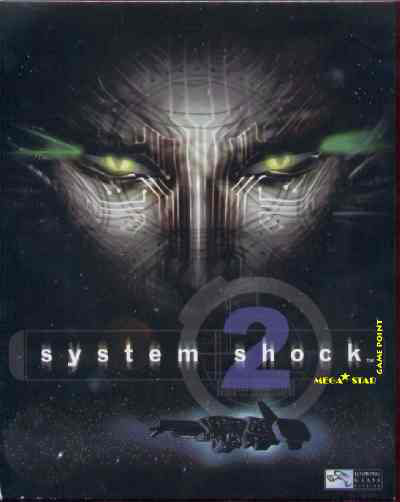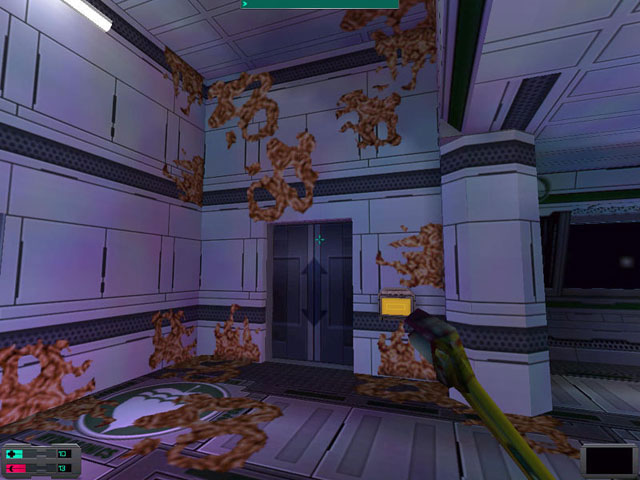The Greatest Games of All Time: System Shock 2
Long before Grand Theft Auto established the video game sandbox, before "emergent gameplay" was an industrywide buzzword, upstart developer Irrational Games married first-person action akin to that of Doom and Half-Life with rich, open-ended character development and a masterfully crafted, horror-tinged storyline to create System Shock 2.
A Shock to the System
System Shock 2
Platform: PC | Genre: Role-PlayingPublisher: Electronic Arts | Developer: Irrational Games | Released: 1999
Long before Grand Theft Auto established the video game sandbox, before "emergent gameplay" was an industrywide buzzword, upstart developer Irrational Games married first-person action akin to that of Doom and Half-Life with rich, open-ended character development and a masterfully crafted, horror-tinged storyline to create System Shock 2. The sequel to the wildly innovative System Shock, a hybrid action-adventure game that was itself well ahead of its time, Shock 2 significantly upped the ante in dramatic and mechanical terms, creating an utterly engrossing, terrifying gameplay experience that we remember fondly as one of the greatest of all time.

The first System Shock pitted you as an unnamed hacker against SHODAN, a rogue artificial intelligence that had overrun a space station and was threatening the very future of humanity itself. When Irrational took the reins of the franchise some five years later, it didn't merely crank out a cookie-cutter sequel in which you fight SHODAN again in some generic locale. The new story takes place 42 years later, as humankind is attempting its first leap into faster-than-light travel. You awaken on the historic vessel Von Braun to find the rest of the crew slaughtered...or worse, mutated into monstrosities beyond recognition. A terrible biological collective known as the Many has overrun the Von Braun and its piggybacked security ship, the Rickenbacker, and as the lone survivor, it's up to you to investigate the horrible goings-on and find a way off the doomed, derelict ships.
But then, you're not really the only survivor of the disaster. Almost from the beginning, you receive help via voice comm from a scientist allegedly stranded in the upper decks of the ship. Midway through the game, you finally reach her hiding place, only to discover that the assistance has been coming from none other than SHODAN, the malevolent AI from the original game, who through a series of strange circumstances has become embedded in the Von Braun's computer system. This unseen twist ranks right up there with "Aeris dies" as one of the most shocking and effective video game plot devices we've ever encountered. The game goes on to surprise you again and again with new developments and ingenious ties to the original game, finally culminating in yet another brilliant twist that has left us aching for a sequel these last six years.

Shock 2 gave you seemingly infinite choice. You could choose from three professions at the outset: a technically proficient interstellar naval officer who specialized in mechanics and hacking; a gun-toting, shoot-first-and-ask-questions-later marine; and a psi-ops agent with a bevy of psychic powers. Each character class had different options for approaching a given situation. When faced with a security camera, the navy officer might hack a nearby computer panel to disable it, while the marine would simply blow it away, and the psychic would use his mind to redirect the camera temporarily. Throughout the game you could further specialize within your profession, which gave you access to certain more-powerful weapons and abilities and precluded the use of others. Needless to say, Shock 2 had an enormous amount of replay value.
It wasn't just the dynamic, open-ended gameplay and the twisting, thoroughly imaginative storyline that made System Shock 2 so entertaining. The game was scary. Damn scary. And this isn't schlocky-horror-movie-style monster-closet scary, where the bogeyman jumps out at you when you least expect it. Shock 2 projected real psychological terror through the tragic grotesquery of the formerly human enemies, the urgency and grim portent of the crew members' audio logs, and the unparalleled sound design that brought the menace and forebodingness of the Von Braun to horrible life. Oh, and then there were the psychic monkeys with the oversized, exposed brains--can't forget those. System Shock 2's brand of horror wasn't in-your-face, but it sure got into your head and festered there, as you witnessed the tragedies that had befallen the Von Braun's crew one deck after another.
System Shock 2 was Irrational's first game, and it was an unexpected, utterly rousing success both in light of and in spite of that fact. With regard to our undying love for this game, we spoke briefly to Ken Levine, now general manager at Irrational, about his experience working on the original game, as well as the studio's plans for future games in the same vein.

GameSpot: System Shock 2 had an almost entirely different team at the helm than the first game. Did you feel a lot of pressure to live up to the original? How did you approach the continuation of a storyline you didn't conceive?
Ken Levine: I'd much rather follow up a great game than a bad one--it makes your life a lot easier. System Shock 1 was one of my top five games of all time, so when the chance to do Shock 2 came by, we jumped at it. It gave us a great villain (SHODAN), a great storytelling device (the logs), and an interesting gameworld to play with. Most importantly, we were able to build on the incredible legacy of open-ended, emergent gameplay that Looking Glass pioneered with games like Shock 1, Ultima Underworld, Terra Nova, and Thief. I'm not ashamed to say at the time I was at Looking Glass I studied under some of the smartest people in the industry.
However, Shock 2's core team contained only a couple of people who worked on the first game. Frankly, most of us were first-timers, amateurs. Personally, I had never shipped a game before Shock 2. What we lacked for in experience, we made up with enthusiasm and a deep respect (and, I hope, understanding) of the kind of game we were trying to make: an open-ended experience that immersed the player in a thoroughly believable environment.
GS: Shock 2's storyline introduced a terrifying new antagonist (the Many) while masterfully recasting SHODAN as an aide to the player--at least for a while. Where did you find inspiration for the game's winding plot arc?

KL: If I had a single goal in making Shock 2, it was to corrupt the relationship of the player with the game. Games tend to be very trustworthy--good guys are good, bad guys are bad. What you see and perceive is real. Sometimes characters are betrayed, but the player never is. I wanted to violate that trust and make the player feel that they, and not [only] the character, were led on and deceived. A lot of these goals were quite controversial amongst the team during development, but I held my ground. On this issue, I think I was right. On others (like weapons breakage), I might have missed the mark...
GS: The ending of Shock 2 left quite a bit of room for a sequel. Do you have plot ideas for a Shock 3? Do you wish EA would revive or release the license so the game could be made?
KL: Right now, my focus is all BioShock, all the time. Irrational has a set of core design principles that we first experimented with on Shock 2 that are really going to reach fruition with BioShock. Game design and narrative principles have always mattered to me much more than a particular property or franchise. The world has also changed since Shock 2. Back then, the idea of player-driven, open-world games were in their infancy and not particularly popular. Now they're common. If you were to come to Irrational's Boston office today and spend some time with the BioShock dev team, you would see our vision of where this genre is going.
Special thanks to Ken Levine for his cooperation in the production of this article. For an even more in-depth look at System Shock 2, have a look at GameSpot's retrospective feature on the game's development.
-- Brad Shoemaker
Got a news tip or want to contact us directly? Email news@gamespot.com
Join the conversation